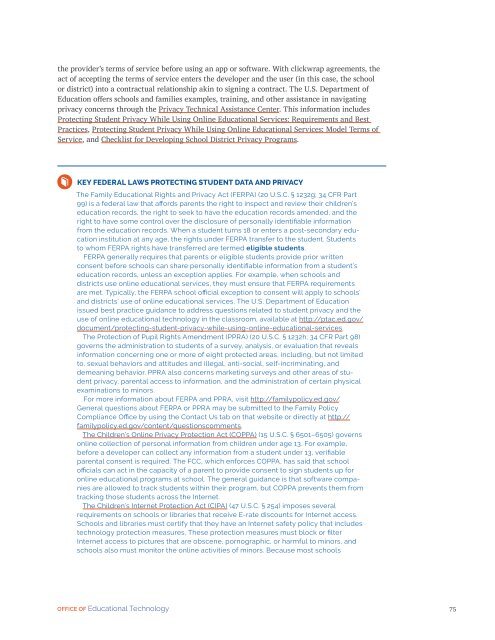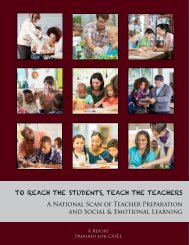Future Ready Learning
7m3sdJ
7m3sdJ
Create successful ePaper yourself
Turn your PDF publications into a flip-book with our unique Google optimized e-Paper software.
the provider’s terms of service before using an app or software. With clickwrap agreements, the<br />
act of accepting the terms of service enters the developer and the user (in this case, the school<br />
or district) into a contractual relationship akin to signing a contract. The U.S. Department of<br />
Education offers schools and families examples, training, and other assistance in navigating<br />
privacy concerns through the Privacy Technical Assistance Center. This information includes<br />
Protecting Student Privacy While Using Online Educational Services: Requirements and Best<br />
Practices, Protecting Student Privacy While Using Online Educational Services: Model Terms of<br />
Service, and Checklist for Developing School District Privacy Programs.<br />
KEY FEDERAL LAWS PROTECTING STUDENT DATA AND PRIVACY<br />
The Family Educational Rights and Privacy Act (FERPA) (20 U.S.C. § 1232g; 34 CFR Part<br />
99) is a federal law that affords parents the right to inspect and review their children’s<br />
education records, the right to seek to have the education records amended, and the<br />
right to have some control over the disclosure of personally identifiable information<br />
from the education records. When a student turns 18 or enters a post-secondary education<br />
institution at any age, the rights under FERPA transfer to the student. Students<br />
to whom FERPA rights have transferred are termed eligible students.<br />
FERPA generally requires that parents or eligible students provide prior written<br />
consent before schools can share personally identifiable information from a student’s<br />
education records, unless an exception applies. For example, when schools and<br />
districts use online educational services, they must ensure that FERPA requirements<br />
are met. Typically, the FERPA school official exception to consent will apply to schools’<br />
and districts’ use of online educational services. The U.S. Department of Education<br />
issued best practice guidance to address questions related to student privacy and the<br />
use of online educational technology in the classroom, available at http://ptac.ed.gov/<br />
document/protecting-student-privacy-while-using-online-educational-services.<br />
The Protection of Pupil Rights Amendment (PPRA) (20 U.S.C. § 1232h; 34 CFR Part 98)<br />
governs the administration to students of a survey, analysis, or evaluation that reveals<br />
information concerning one or more of eight protected areas, including, but not limited<br />
to, sexual behaviors and attitudes and illegal, anti-social, self-incriminating, and<br />
demeaning behavior. PPRA also concerns marketing surveys and other areas of student<br />
privacy, parental access to information, and the administration of certain physical<br />
examinations to minors.<br />
For more information about FERPA and PPRA, visit http://familypolicy.ed.gov/.<br />
General questions about FERPA or PPRA may be submitted to the Family Policy<br />
Compliance Office by using the Contact Us tab on that website or directly at http://<br />
familypolicy.ed.gov/content/questionscomments.<br />
The Children’s Online Privacy Protection Act (COPPA) (15 U.S.C. § 6501–6505) governs<br />
online collection of personal information from children under age 13. For example,<br />
before a developer can collect any information from a student under 13, verifiable<br />
parental consent is required. The FCC, which enforces COPPA, has said that school<br />
officials can act in the capacity of a parent to provide consent to sign students up for<br />
online educational programs at school. The general guidance is that software companies<br />
are allowed to track students within their program, but COPPA prevents them from<br />
tracking those students across the Internet.<br />
The Children’s Internet Protection Act (CIPA) (47 U.S.C. § 254) imposes several<br />
requirements on schools or libraries that receive E-rate discounts for Internet access.<br />
Schools and libraries must certify that they have an Internet safety policy that includes<br />
technology protection measures. These protection measures must block or filter<br />
Internet access to pictures that are obscene, pornographic, or harmful to minors, and<br />
schools also must monitor the online activities of minors. Because most schools<br />
OFFICE OF Educational Technology<br />
75



